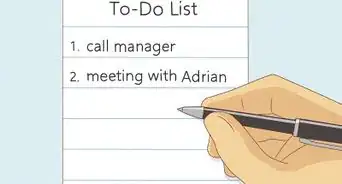This article was co-authored by Arda Ozdemir, MA. Arda Ozdemir is the Executive Coach and Founder of Rise 2 Realize, a nonprofit organization in Palo Alto, California that is dedicated to providing a practical roadmap toward one's full potential in their life and career. Arda is a Reiki Master, an Emotional Freedom Technique Practitioner, and a certified HeartMath Trainer and Mentor.
This article has been viewed 25,446 times.
Everyone would like to be able to accomplish more in less time. It is easy to just accept that some people are naturally more productive and others more prone to procrastination. However true that may be, it is also clear that productive people take advantage of various useful strategies that can benefit anyone.
Steps
Getting Organized
-
1Set a routine. Plot out recurring times in your schedule when you can focus your energies on the specific tasks you need to accomplish. Incorporate them into you existing daily routines (getting ready for work, lunchtime, etc.). Just as your body tells you "this is lunchtime" around the time you normally eat, you will become more attuned to feeling that "this is productive time."
-
2Break up larger tasks. Don't focus on needing to write the entire book or paint the whole house; focus on finishing a chapter or a room. The sense of accomplishment will help keep you going, and it provides a way to mark your progress towards the larger goal.Advertisement
-
3Create deadlines. Remember that time you had to finish a college term paper in one night? When there is a clear time limit, you have no choice but to focus your energies and stick to the essentials of your goal.
- If you're already on a deadline, set up mini-deadlines for components of the task.
- Try to be strict with yourself as it is easy to break self-created deadlines. Put your deadline up against an appointment you can't miss or just set an egg timer.
-
4Establish the right amount of time to finish the job. "Work expands to fill the time" -- what sounds like old-fashioned wisdom can also be expressed by mathematical formulas, but the point of Parkinson's Law remains the same.[1] Basically, if you give yourself all day to accomplish a task, you'll find a way to take all day to do it (or overdo it, that is). Figure out the minimum amount of time you need to do the job up to the necessary standard.
-
5Plan but be flexible.[2] Do all the routine-making and deadline-setting you can, but also realize that life will intervene and you will need to be able to adjust. Don't let disruptions throw you completely off your rhythm. See if you can find ways to take advantage of them, or at least brush them off.
- For example, if you're trying to finish up a presentation for tomorrow morning and the power goes out, recruit someone to help you practice the Q&A session that follows until power is restored. Or even use it to make a lame joke the next day about how a competitor tried to sabotage your clearly blackout-proof presentation.
Listening to Your Body
-
1Know oneself. If you're a morning person or a "night owl," take advantage of that. Maximize your most productive times. If music helps you focus, use it; if it distracts you, forget it.[3]
- Think about what has worked when you've been productive in the past. Did your college finals studying go better when you holed up in a silent corner of the library or when your room-mates were playing video games three feet away?
-
2Take "mindless breaks." When your brain is fried and you need to step away, do it. Watch a soap opera, walk your dog, clean a few of those dusty shelves you've been meaning to get to.[4]
- Expect to need such breaks and factor them into your schedule. This way you won't feel like you're wasting time while you're, well, wasting time (but in a positive way).
-
3Get out in the sun. Natural sunlight helps keep your body rhythms balanced, gives you energy, and just plain feels good.[5] Take a walk or work by a window when you can.
-
4Exercise. It breaks up the monotony of the day, relieves stress, helps you refocus your mind, and it's good for you.
-
5Do a "brain dump." As you work on a project, your mind will fill up with ideas, some relevant to the current task, some not. If you're feeling bogged down or stuck as you try to figure out a task, work on emptying your mind of distracting ideas. But keep them around just in case!
- Jot down your scattered ideas in a notepad (or your preferred more technologically advanced device) at the end of the day or when you're feeling mentally overloaded.
- Don't worry about connecting all the dots right now. This is another form of brainstorming; get the ideas out, figure out what works, what doesn't, and how they connect later.
Prioritizing
-
1Be realistic. Some people who think they are unproductive are in fact productive people who just expect too much of themselves. Don't bite off more than you can chew. Productive people aren't 'super-humans'; they know what they can accomplish (and their limits) and focus on getting the job done.
- Consider whether you would ask someone else to accomplish as much as you're attempting. If you would feel bad asking someone else to do that much, you're probably asking too much of yourself.
- At the end of the day, write down a list of all that you did accomplish. It might surprise you, and it will give you something else to look at other than that lengthy to-do list you started with that morning.
-
2Keep it simple. Think about the essential element(s) of what it is you want or need to accomplish. It is easier to hit a clear target.
- Focus on your results, not on the time it takes to get there.[6] After all, we're usually judged on results. We don't care how long it took the baker to make our wedding cake or what methods he used; we just want it to look and taste great.
-
3Determine the importance and urgency of your tasks. Like a good general (and pretty decent President) should, Dwight Eisenhower knew how to get things done. He made a point of determining what was truly important and truly urgent, and was known to say "What is important is seldom urgent, and what is urgent is seldom important."
- The Eisenhower Box breaks tasks into four categories: Important and Urgent (do those now); Important but Not Urgent (decide when you want to do those later); Not Important but Urgent (delegate those to others); Not Important and Not Urgent (delete those from your list).[7]
- Of course, not everyone has the same ability to delegate tasks as does a general or President, but such tasks can also be opportunities for collaborative work. Know your strengths, and the strengths of those around you.
-
4Know what is most important. We all want to be more productive, but if your quest for productivity is severely curtailing you family time or damaging something else of great value to you, take a step back and prioritize your values. If you gain exceptional productivity at the cost of something far more precious to you, what have you truly gained?[8]
Expert Q&A
Did you know you can get expert answers for this article?
Unlock expert answers by supporting wikiHow
-
QuestionWhy can't I push myself to follow through at work?
 Arda Ozdemir, MAArda Ozdemir is the Executive Coach and Founder of Rise 2 Realize, a nonprofit organization in Palo Alto, California that is dedicated to providing a practical roadmap toward one's full potential in their life and career. Arda is a Reiki Master, an Emotional Freedom Technique Practitioner, and a certified HeartMath Trainer and Mentor.
Arda Ozdemir, MAArda Ozdemir is the Executive Coach and Founder of Rise 2 Realize, a nonprofit organization in Palo Alto, California that is dedicated to providing a practical roadmap toward one's full potential in their life and career. Arda is a Reiki Master, an Emotional Freedom Technique Practitioner, and a certified HeartMath Trainer and Mentor.
Career & Life Coach
References
- ↑ http://www.economist.com/node/14116121
- ↑ https://hbr.org/2011/05/managing-yourself-extreme-productivity
- ↑ Arda Ozdemir, MA. Career & Life Coach. Expert Interview. 14 March 2019.
- ↑ http://www.realsimple.com/work-life/life-strategies/inspiration-motivation/how-be-more-productive
- ↑ http://www.realsimple.com/work-life/life-strategies/inspiration-motivation/how-be-more-productive
- ↑ https://hbr.org/2011/05/managing-yourself-extreme-productivity
- ↑ http://www.entrepreneur.com/article/233054
- ↑ Arda Ozdemir, MA. Career & Life Coach. Expert Interview. 14 March 2019.
About This Article
To be more productive, take large tasks and break them into smaller, more manageable steps. The sense of accomplishment from finishing each small step will keep you going, and lets you mark your progress towards your larger goal. You should also allow yourself to take mindless breaks every so often to refresh your mind when your brain feels fried. Try using some of these breaks to get outside in the sunshine if you can, since natural sunlight gives you energy and keeps your mood up. Exercise breaks are also important for refocusing your mind and relieving stress. As you work on a project and your mind is getting bogged down with excessive ideas, do a “brain dump” where you jot down your scattered ideas to clear them from your head. For more tips on being productive, like how to prioritize your time and set deadlines for yourself, keep reading!























-Step-8.webp)


















































